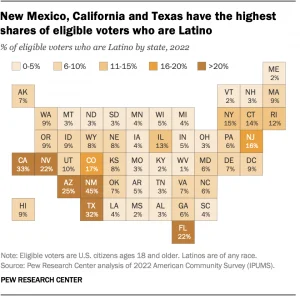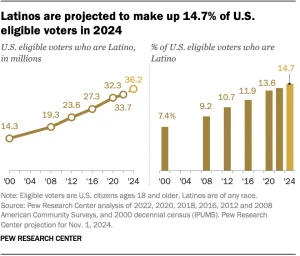Democrats cannot take Latino support for granted in the 2024 presidential election due to shifting partisan loyalties among Hispanic voters heading into November, according to new polling by Unidos US and BSP Research.
If the election were held today, 55% of Latinos say they would vote for President Joe Biden and 33% say they would choose Donald Trump, researchers said. Only 51% of Latino voters said they approve of the job Biden is doing and a minority, 31%, said they approve of the way Republicans are leading the U.S. House of Representatives.
But there is little cause for celebration in either party as significant numbers of Latino voters expressed a willingness to back political parties other than their own and because younger Hispanic are registering as independents, the study found. “There is ‘churn’ across the electorate, with self-reports of shifting sentiment at both ends of the spectrum, and a growth of skepticism about the parties.”
There is little cause for celebration in either party as significant numbers of Latino voters expressed a willingness to back political parties other than their own and because younger Hispanic are registering as independents.
With so many Latino voters apparently up for grabs, Democrats and Republicans would be wise to go all out to win their support, Unidos said. “In 2024, it is anticipated that 17.5 million Latinos will cast a ballot, and one in four will do so for the first time in a presidential election. A full 38% of this electorate will be new since the Trump/Clinton match-up of 2016.”
Latino support is a moving target thanks to issues such as jobs, immigration and abortion, Unidos said.
Researchers found 33% of Latino voters are either “somewhat” or “much more open” to supporting Democrats than in previous elections, compared to 24% who said the same about Republicans. Among those reporting no change in dedication to party were 24% of Democrats, 8% of Republicans and 11% of independents. Altogether, 57% of Latino voters fully or partly lean toward Democrats compared to 32% who favor Republicans to varying degrees.
Among all Latino voters, Republican-leaning Democrats were more inclined to support Biden (49%) than were Democratic-leaning Republicans, who overwhelmingly backed Trump (69%).
“The decline in Biden support does not manifest in an equal increase for Trump, as more of the difference is to be found in ‘don’t know’ rather than Trump,” researchers found.
Younger voters, meanwhile, demonstrate significantly lower presidential approval (43%) than do more established voter (53%). Younger Latino voters express slightly more support (37%) for the Republican House majority than do longer-term voters (30%).
But discerning how newer, mostly younger Latinos will vote in November is tricky because so many are eschewing partisanship, Unidos found. They are 14 points less likely to identify as Democrats (45%) compared to more seasoned Latino voters. By comparison, they are five points less likely to claim Republican identity (18%) than older Latino voters (23%). “Independence is the big winner, with 36% of voters in newer cohorts identifying as independent or nonpartisan, compared with just 18% of established voters.”
 The effect of shifting political allegiance may be felt most in key battleground states that, in 2020, contributed to Trump’s margins of victory in Florida, North Carolina and Texas, and to Biden’s narrow wins in Arizona, Georgia, Pennsylvania, Nevada, Michigan and Wisconsin. “Failure to maintain or grow those margins could be sufficient to cost Democrats the (2024) election. Likewise, effective Democratic persuasion, or lack of it on the Republican side, could imperil GOP hopes and cost them (North Carolina),” the study said.
The effect of shifting political allegiance may be felt most in key battleground states that, in 2020, contributed to Trump’s margins of victory in Florida, North Carolina and Texas, and to Biden’s narrow wins in Arizona, Georgia, Pennsylvania, Nevada, Michigan and Wisconsin. “Failure to maintain or grow those margins could be sufficient to cost Democrats the (2024) election. Likewise, effective Democratic persuasion, or lack of it on the Republican side, could imperil GOP hopes and cost them (North Carolina),” the study said.
In a separate study released earlier this year, Pew Research Center shed light on the dominance of Hispanic voters in each state, with New Mexico (45%), California (33%), Texas (32%), Arizona (25%) and Florida (22%) leading the way.
“New Mexico is also the only state in which Latinos make up a higher share of the total eligible voter population than any other racial or ethnic group,” Pew found. “This includes Americans who are white alone and non-Hispanic, who account for 40% of New Mexico’s eligible voters.”
In California and Texas, Latinos have the second-highest share among other major ethnic and racial groups, Pew added. “California and Texas are also the only states where non-Hispanics who are white and no other race make up a plurality, but not a majority, of the eligible voter population (42% in California and 47% in Texas).”
 But Latino voters in those or other states cannot be assumed to support Democrats, Unidos said. “In net, Trump is doing not much better than he did in 2020 among Latino registered voters. But President Biden is doing worse, with Democratic erosion moving to ‘undecided.’”
But Latino voters in those or other states cannot be assumed to support Democrats, Unidos said. “In net, Trump is doing not much better than he did in 2020 among Latino registered voters. But President Biden is doing worse, with Democratic erosion moving to ‘undecided.’”
Economic concerns are driving many Hispanics toward conservatives, the Pew study found. “‘Jobs and the economy’ was identified by 51% of those Democrats claiming greater openness to the GOP as one of their top issues. This figure is 10 points higher than Democrats reporting no move and 12 points higher than Democrats shifting further to their own party.”
Among all Latino voters surveyed, 55% identified inflation and the cost of living as the issues elected officials should prioritize, followed by jobs and the economy at 43%, health care at 31%, crime and gun violence at 29%, affordable housing at 24% and immigration and border issues at 21%.
On abortion, 48% of Latino voters prefer the Democratic stance versus 21% who support Republicans on the issue. Likewise, 52% of Republican-leaning Democrats said Democrats do a better job on abortion, while 40% of Democratic-leaning Republicans said the same.
Majorities of Hispanic voters across all categories, meanwhile, agreed it is wrong to make abortion illegal, including 72% of all Hispanic voters, 72% of GOP-leaning Democrats and 59% of Democratic-leaning Republicans.


